
In the dedication to Areius, Dioscorides explains his reasons for writing the treatise on medicinal plants, and the method he followed.
He writes of the need for comprehensive information, covering both the precise description of plants and the methods of preparing recipes. Dioscorides is a true forerunner of the method of scientific research, in that he states that one must have evidence of the efficacy of plants and compounds on diseases, and that he intends to use both information that is common knowledge and information that is related in some way. Dioscorides emphasizes the need to prepare each medicine accurately, and to judge each medicine on its own merits. In several instances he explains how to prepare medicines from the plants that make up the recipe, and for each plant he makes a list of its medicinal uses with notations, in some cases, of harmful side effects. And on this aspect, too, he is a forerunner of modern clinical pharmacology.
He also gives advice for the most suitable containers for storing medicines, for example, he says that flowers and aromatic plants should be put in wooden boxes, that wet medicines can be put in containers of silver, glass, horn or earthenware, if it is not too thin.
Analysis, with current knowledge, of some of the medicinal herbs proposed by Dioscorides has enabled us to understand that the plants indicated by Dioscorides have a high rate of efficacy for the specific conditions proposed. For example, if we examine the plants that Dioscorides considered diuretic, in light of the results of current clinical studies, we observe that 83.6 percent of Dioscorides' diuretic herbs that have been studied actually have diuretic properties. This rate of accuracy allows us to rule out the possibility of random correlation and leads us, therefore, to argue that Dioscorides, or the sources he drew on, may have observed, with precision and diligence, the diuretic action of plants in clinical practice at the time, rather than merely reporting anecdotes not based on actual observations.
The goodness of the pharmacological effects reported by Dioscorides and confirmed for plants that have been studied with modern techniques of scientific investigation suggests that other herbs, classified by Dioscorides as effective for specific diseases but not studied in our day, may represent excellent candidate herbs, to be subjected to scientific research for the identification of new medicinal plants and new active ingredients, effective for specific diseases.
